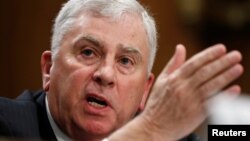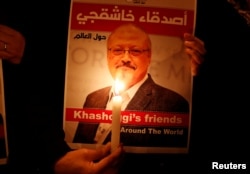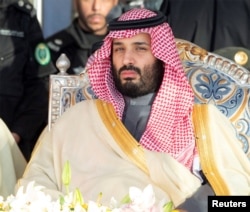President Donald Trump's pick for ambassador to Saudi Arabia defended on Wednesday America's relationship with the kingdom in the face of unflagging congressional outrage over the killing of dissident Saudi journalist Jamal Khashoggi.
Florida Republican Marco Rubio declared that Crown Prince Mohammed bin Salman had gone "full gangster."
However, retired Army Gen. John Abizaid told the Senate Foreign Relations Committee, "It's a vital national interest that we have a sound relationship with Saudi Arabia to counter malign Iranian influence."
While acknowledging tensions between Washington and Riyadh, the nominee said, "We need a strong and mature partnership with Saudi Arabia. Reform there promises to make the kingdom more dynamic, more prosperous, and the region more stable."
Senators of both parties expressed revulsion over recent Saudi actions, as well as the kingdom's U.S.-backed military campaign in Yemen. The United States has sanctioned 17 Saudis for allegedly killing Khashoggi, a Washington Post columnist, at the kingdom's consulate in Turkey last October.
"At the same time they are letting women drive, they are sending a team of thugs with a bone saw to chop somebody up in another country — a writer and a resident of our country," Kentucky Republican Rand Paul said. "So, I don't think we should be fooled."
The panel's top Democrat, Bob Menendez of New Jersey, said, "Repeated stories of U.S.-supplied bombs hitting weddings, funerals and school buses [in Yemen] are simply unacceptable."
Rubio focused his remarks on Saudi Arabia's de facto ruler, Salman.
"He's kidnapped the prime minister of Lebanon. He kicked out the ambassador of Canada. Canceled flights to Toronto. Cut off investments. Recalled all their students in Canada, over a tweet. ... He ordered or knew of efforts to murder Jamal Khashoggi," Rubio said. "He's gone full gangster, and it's difficult to work with a guy like that, no matter how important the relationship is."
Abizaid said Washington can't ignore the crown prince's "malign" actions, but added, "Our relationship with Saudi Arabia is bigger than the relationship just with the crown prince. It's all about a nation. It's about a government."
The nominee added, "These short-term problems have to be solved now. And it requires forceful discussions on behalf of the United States with the government of Saudi Arabia."
Abizaid assured New Hampshire Democrat Jeanne Shaheen that if confirmed, he would consistently raise human rights issues with Saudi officials. But he pushed back when Shaheen asked how he would "hold the Saudis accountable" for their actions.
"Ambassadors don't hold countries accountable. Countries hold countries accountable," the nominee said. "It's the role of the United States to ensure that the Saudis know what we stand for, what we believe and what the relationship needs to be to move forward. I will ensure that those ideals, those values, those mutual interests are conveyed as clearly as I can to the government of Saudi Arabia."
Positive view of Saudi Arabia
Abizaid insisted the news from Saudi Arabia is not all bad, and shared observations from a recent trip to the kingdom.
"I saw some very innovative and very effective programs aimed specifically at reducing terrorism, both financially and on the field of battle," he said. "He [Salman] has sent a very clear message that he favors a more tolerant view of Saudi Wahabi Islam, and I see evidence of that."
That assertion drew an incredulous response from Democrat Chris Murphy of Connecticut.
"The locking up of women dissidents is not necessarily a great advertisement that you [Salman] are willing to push for a more tolerant version of Islam," he said.
Meanwhile, Paul urged a rethinking of America's approach to the U.S.-Saudi relationship, arguing that Washington has long ignored Riyadh's misdeeds.
"I think we've turned a blind eye because of oil, because they tend to side with us against Iran," he said. "And I think there needs to be a more even-handed look at this. Not saying that Iran is good, but maybe both [Iran and Saudi Arabia] are malign actors."
Abizaid had a more positive view of decades-old ties between Washington and Riyadh.
"The United States has a long history of cooperation with the kingdom of Saudi Arabia. It is difficult to imagine a successful U.S. effort to undercut Sunni extremism or keep Iran in check without engaging and partnering with the kingdom," he said.
Senators of both parties heaped praise on Abizaid's military career, including four years as commander of U.S. Central Command during the George W. Bush administration.
Senators predicted his confirmation to the post, which has been vacant for two years.









